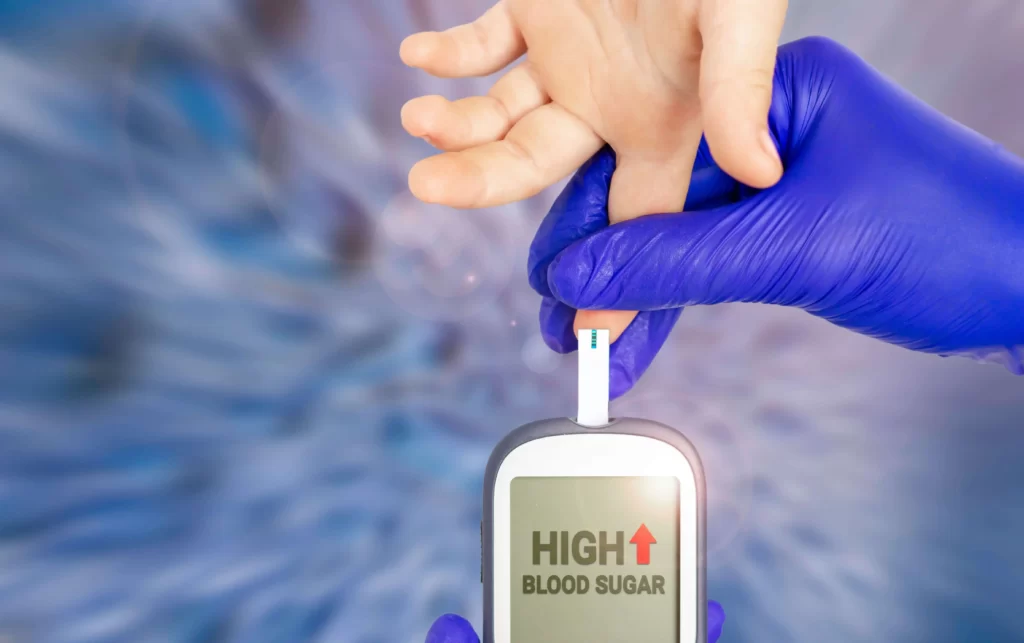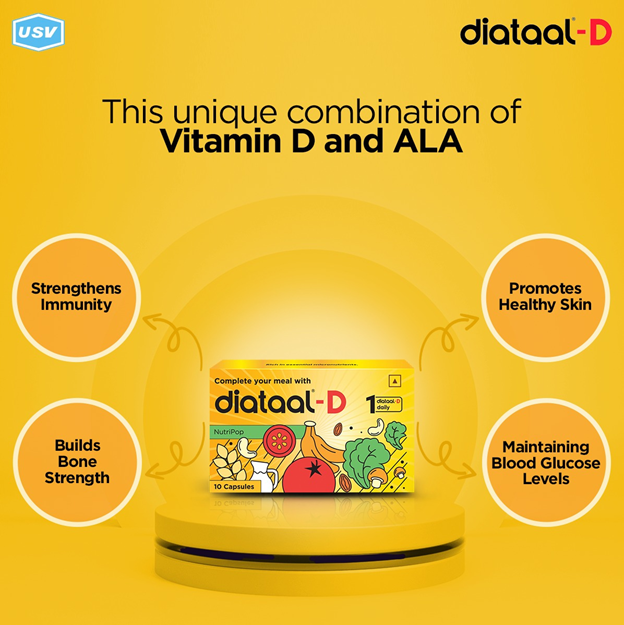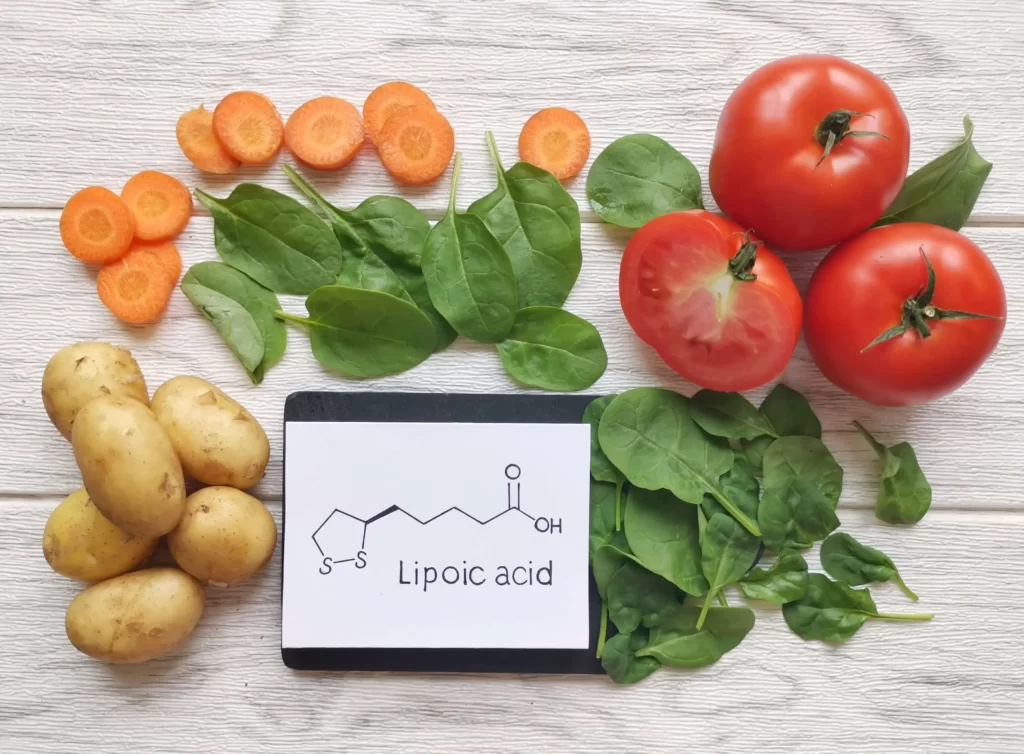
Vitamin D and ALA: How These Vitamins Help in Controlling Blood Glucose Levels?
Heard about maintaining healthy glucose levels in your body? If not, you must know that it’s extremely important for the overall functioning of the body. And in case you have diabetes, it becomes a mandate. Vitamins, such as vitamin D and alpha-lipoic acid (ALA) play a significant role in maintaining the blood glucose levels of the body. In this blog post, we have delved into the importance of both these vitamins in detail. Ready to read?
Index
| ● Introduction |
| ● Understanding Blood Glucose Levels |
| ● The Role of Vitamin D in Blood Glucose Control |
| ● Alpha-Lipoic Acid (ALA) and its Impact on Blood Glucose Levels |
| ● Combined Effects of Vitamin D and ALA on Blood Glucose Control |
| ● Dietary Sources and Supplementation |
| ● Conclusion |
| ● Product Mentioned in the Blog |
| ● FAQs |
Understanding Blood Glucose Levels
Blood glucose levels, also known as blood sugar levels, refer to the concentration of glucose in the bloodstream. Glucose is the primary source of energy for the body’s cells and is obtained from the food we consume which makes maintaining proper blood glucose levels crucial for overall health and well-being. The normal range for fasting blood glucose is typically between 70 and 100 milligrams per deciliter (mg/dL).
When you have diabetes, your body isn’t able to get the sugar from the blood into cells or make enough insulin. This causes high blood sugar levels in the body. If you’re diabetic, managing your blood glucose levels is extremely essential. Consistently high blood glucose levels can lead to long-term complications affecting various organs, including the heart, kidneys, eyes and nerves. It can also increase the risk of cardiovascular diseases, kidney disease, blindness, nerve damage and other serious health problems.

Act, before it’s too late
The Role of Vitamin D in Blood Glucose Control
Vitamin D, often referred to as the “sunshine vitamin,” is primarily synthesized by the body when the skin is exposed to sunlight. It also occurs naturally in certain foods and can be obtained through supplements. Vitamin D deficiency has been linked to an increased risk of developing diabetes and impaired blood glucose control. Studies suggest that adequate levels of Vitamin D may improve insulin sensitivity, thereby supporting healthy blood glucose regulation.
Alpha-Lipoic Acid (ALA) and its Impact on Blood Glucose Levels
Alpha-lipoic acid is an antioxidant that naturally occurs in certain foods such as spinach, broccoli, and organ meats. ALA enhances insulin sensitivity and promotes the uptake of glucose into cells, thereby reducing blood glucose levels. Additionally, ALA exhibits antioxidant properties that can help protect against oxidative stress associated with diabetes.
Combined Effects of Vitamin D and ALA on Blood Glucose Control
Both vitamin D and alpha-lipoic acid (ALA) have potential effects on blood glucose control and the management of diabetes. While they have distinct mechanisms of action, they complement each other in certain ways to improve glucose metabolism and improvement in diabetes.
- They possess anti-inflammatory properties that help reduce inflammation, which is associated with insulin resistance.
- Their combined antioxidant property provides enhanced protection against cellular damage caused by high blood glucose levels.
- Both have separate effects on pancreatic function. Vitamin D can enhance the function of pancreatic beta cells, while ALA may provide protection against oxidative damage to these cells. By supporting the health and function of pancreatic beta cells, they may contribute to improved insulin production and secretion.

Dietary Sources and Supplementation
Some of the vitamin D-rich foods include:
- Fatty fish including salmon, mackerel, sardines and trout
- Cod liver oil
- Fortified foods like milk, orange juice, cereals and yogurt
- Egg yolk
- Mushrooms

Incorporate vitamin D-rich foods in your diet
Some of the alpha-lipoic acid foods include:
- Flaxseeds
- Chia seeds
- Walnuts
- Hemp seeds
- Soybeans

Choose your diet wisely
The levels of vitamin D and ALA that our body needs on a daily basis may not be met by just a healthy balanced diet. You may require to eat adequate amounts of vitamin D tablets and ALA supplementation to control your blood sugar levels. The recommended daily intake of vitamin D in adults is between 15 – 20 mcg. And the daily intake of ALA in male adults is 1.6 g, whereas it is 1.1 g in female adults. One of the best supplements to control blood sugar is one that has an adequate mix of both vitamin D and ALA.
Conclusion
Now, you know that maintaining healthy glucose levels is crucial for overall well-being, especially for people with diabetes. While vitamin D and ALA promises to manage your blood sugar levels, you must make sure to fulfill these vitamin needs with vitamin D tablets and ALA supplementation. Diataal D a supplement combined with the benefits of vitamin D, ALA and other nutrients, is one of the best supplements to control blood sugar levels. It enhances immunity, helps in energy production, promotes healthy skin and takes care of the nutritional requirements of your body. If you’re diabetic, it is advisable to consult a healthcare professional before starting on any diabetes supplementation.

Pair it with vitamin D-rich and alpha-lipoic acid foods
Product Mentioned in the Blog
Diataal D NutriPop Multivitamins
FAQs
How does Vitamin D help in improving insulin sensitivity?
Vitamin D aids in improving insulin sensitivity by enhancing insulin receptor function in various tissues, such as muscle and fat cells. This means that when you have sufficient vitamin D levels, your body is better able to use insulin to transport glucose from the bloodstream into the cells, thus helping to regulate blood sugar levels.
How do I know if I have an ALA deficiency?
Some signs and symptoms that may indicate a deficiency include fatigue, muscle weakness, numbness or tingling in the legs or arms and difficulties with cognitive function.
Can low vitamin D cause high glucose?
Inadequate vitamin D levels can lead to insulin resistance, where the body’s cells do not respond properly to insulin, resulting in elevated blood glucose levels.
How does vitamin D work synergistically with ALA to manage blood glucose levels?
Vitamin D helps optimize insulin sensitivity, while ALA provides additional support by reducing oxidative stress and inflammation.
Should I consult a healthcare professional before starting vitamin D and ALA supplementation for blood sugar control?
Yes, it is advisable to consult a healthcare professional before starting any new supplementation, including vitamin D and ALA, particularly if you have existing medical conditions or take medications.



